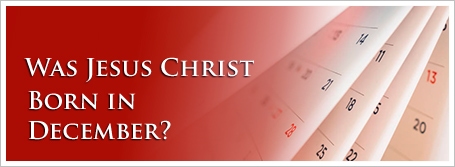“I love celebrating Jesus’ birthday!” my son’s friend proudly proclaimed in school a few days before the December holiday break. My son told his friend he appreciated his love for Jesus and his heart to keep God first during a time of year when people can become focused on material rather than spiritual matters. Then my son also explained that Jesus Christ was not actually born on December 25, when most Christians traditionally celebrate his birth. He knew this because my husband and I had taught him the Word on this matter. The Scriptures, substantiated by historical records, give several solid indications as to when Jesus Christ was actually born.
One factor that helps us determine when Jesus Christ was born is the timing of the conception and birth of John the Baptist, whose birth preceded Jesus Christ’s by six months. Zacharias, the man who would become John the Baptist’s father, was a priest of the course of Abia (Luke 1:5), which meant that he was assigned to carry out certain duties in the Temple at Jerusalem for a specified week twice a year. By calculating with the aid of chronological tables, we learn that the priests of the course of Abia would have been in their first term of annual service (according to our months) in the last week of May in 4 B.C. It was during this time that John’s father found out that he was going to have a son (Luke 1:8-13). After Zacharias completed his course, he would have returned to his home in the hill country of Judah in early June of 4 B.C. Soon afterward his wife, Elisabeth, conceived, according to the promise of the angel, and nine months later in March, 3 B.C., John the Baptist was born.
During Elisabeth’s sixth month of pregnancy (December, 4 B.C.), three months before John was born, God sent the angel Gabriel to tell Mary that she was also going to conceive and bear a child (Luke 1:26-31). Mary responded to the angel by saying, “…Behold the handmaid of the Lord; be it unto me according to thy word…” (Luke 1:38). Perhaps it was at the moment she uttered these words that she conceived. Nine months from December of 4 B.C. sets Jesus’ birth in September of 3 B.C.
That Jesus was born in September, 3 B.C. is also supported by the Biblical record of Jesus’ birth in Luke 2.
Luke 2:1,4-6:
And it came to pass in those days, that there went out a decree from Caesar Augustus, that all the world [a figurative reference to the Roman Empire] should be taxed [registered].
And Joseph also went up from Galilee, out of the city of Nazareth, into Judaea, unto the city of David, which is called Bethlehem; (because he was of the house and lineage of David:)
To be taxed [enrolled, registered] with Mary his espoused wife, being great with child.
And so it was, that, while they were there, the days were accomplished that she should be delivered.
These verses indicate that Jesus was born during a registration that was conducted throughout the Roman Empire to record an official declaration of political allegiance to Caesar Augustus from all of his subjects. Historical evidence indicates this registration took place in 3 B.C., the year prior to Caesar’s twenty-fifth anniversary of supreme power, which was celebrated in 2 B.C. This historical evidence supports Jesus’ birth as taking place in 3 B.C.
September was a logical time of the year for such a registration to take place because the weather was mild for travel, the crops had been harvested, and one Judean civil year was closing and another beginning.
Luke 2:7:
And she [Mary] brought forth her firstborn son, and wrapped him in swaddling clothes, and laid him in a manger; because there was no room for them in the inn.
This verse tells us that after Mary brought forth her son, she laid him in a manger, which was normally used as a feeding trough, located in a stable or stall for animals. She did this because there was no more room at the inn. The lack of room was due to the influx of people into Bethlehem for the registration. In December, it would have been too cold to keep a newborn baby in a manger, but in September it would have been warm enough for this arrangement to work. This detail also provides support for September being the month of Jesus Christ’s birth in 3 B.C.
Another aspect of this record that supports the point that Jesus’ birth was not in December is found in verse 8.
Luke 2:8:
And there were in the same country [the same vicinity as Bethlehem] shepherds abiding in the field, keeping watch over their flock by night.
In Bible times in the late summer or early fall, farmers would often hire shepherds to keep their flocks in the farmers’ fields overnight so that the sheep’s manure would fertilize the fields. However, it was far too cold for sheep to graze at night from November through February. The presence of the shepherds is another indication that Jesus Christ could not have been born in December.
The record of John the Baptist’s conception and birth sets the month of Jesus Christ’s birth as September, 3 B.C. The record in Luke 2 supports the month being September and not December, because in December the weather would not have been conducive for travel, for a baby to be lying in a manger, or for shepherds to tend their flocks at night. If you would like to seek out more information on this interesting topic, including the exact date of Jesus Christ’s birth, you can find it in Jesus Christ Our Promised Seed, which is available to purchase from The Way International Bookstore.

